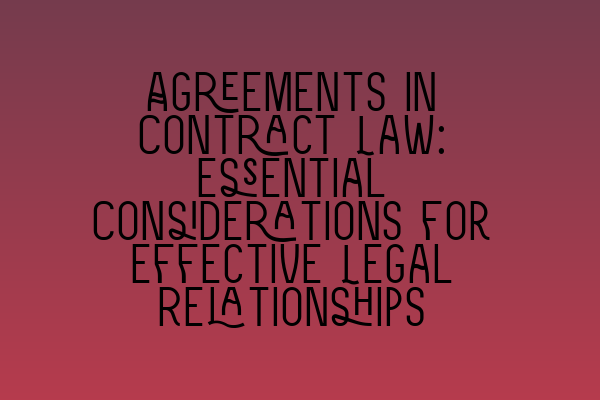Agreements in Contract Law: Essential Considerations for Effective Legal Relationships
Welcome to our blog at SQE Contract Law! In this article, we will be delving into the important topic of agreements in contract law and the essential considerations for creating effective legal relationships. Whether you are a solicitor, business owner, or simply someone interested in understanding the intricacies of contract law, this article is for you.
Before we dive into the details, it’s worth noting that contract law plays a crucial role in ensuring legal certainty and protecting the rights and interests of parties involved in a commercial or personal transaction. Understanding the key elements of an agreement is vital for creating enforceable contracts that stand up in court.
Essential Elements of an Agreement
When entering into a contract, it is crucial to ensure that certain essential elements are present for it to be legally binding. These elements include:
- Offer and Acceptance: An offer is a clear and unequivocal expression of willingness to make a contract, while acceptance is the unqualified and unconditional agreement to the terms of the offer. Both parties must be in mutual agreement.
- Intention to Create Legal Relations: It is essential that both parties intend for the agreement to be legally binding. This intention can be inferred from the circumstances and the nature of the relationship.
- Consideration: Consideration refers to something of value exchanged between the parties. It can be in the form of money, goods, services, or a promise to do or refrain from doing something. Consideration is crucial to distinguish a contract from a mere gift or promise.
- Capacity: Both parties must have the legal capacity to enter into a contract. This means they must be of legal age, mentally competent, and not under any undue influence or duress.
- Consent: Consent refers to the voluntary agreement of both parties to enter into the contract. It must be free from fraud, misrepresentation, mistake, or undue influence.
- Legal Purpose: The agreement must have a legal purpose and not involve any illegal activities or actions that contravene public policy.
By ensuring the presence of these essential elements in your agreements, you can establish a strong legal foundation for your relationships and protect your rights and interests.
Types of Agreements
Contracts can come in various forms, each serving a specific purpose. Some common types of agreements include:
- Express Contracts: These are agreements where the terms are explicitly stated, either orally or in writing. Express contracts provide clarity and leave little room for ambiguity.
- Implied Contracts: In contrast to express contracts, implied contracts are formed based on the parties’ conduct or the circumstances surrounding their relationship. The terms of the agreement are not explicitly stated but inferred from the actions of the parties involved.
- Unilateral Contracts: Unilateral contracts occur when one party makes a promise in exchange for a specified act or performance by the other party. The contract is only formed when the act or performance is completed. An example of a unilateral contract is a reward for the return of a lost item.
- Bilateral Contracts: Bilateral contracts are the most common type of agreement, where both parties make promises to each other. Both parties are obliged to fulfill their promises once the contract is formed.
Understanding the different types of agreements will help you choose the appropriate form for your specific situation and align the contract with your objectives.
Common Pitfalls to Avoid
While creating agreements, it’s essential to be mindful of common pitfalls that can invalidate or weaken the enforceability of your contract. Here are some common mistakes to avoid:
- Ambiguous or Vague Terms: Clear and precise language is crucial when drafting a contract. Ambiguous or vague terms can lead to misunderstandings or disputes down the line. Be specific and avoid overly complex or convoluted language.
- Incomplete Contracts: It is important to ensure that all relevant terms and conditions are included in the contract. Failing to address essential details can create uncertainty and potential disagreements.
- Failure to Document Changes: Any modifications or amendments to an existing agreement should be documented in writing and signed by both parties. Verbal agreements or undocumented changes can create confusion and ambiguity.
- Ignoring Governing Laws: Contract law varies across jurisdictions. It is crucial to consider the relevant laws and regulations that govern your agreement. Failing to adhere to the applicable laws can render your contract unenforceable.
By avoiding these common pitfalls, you can enhance the effectiveness and enforceability of your contracts.
Conclusion
An agreement in contract law is the foundation of legal relationships and plays a critical role in protecting the rights and interests of parties involved. By understanding the essential elements of an agreement, the different types of agreements, and common pitfalls to avoid, you can create legally binding contracts that foster successful and effective legal relationships.
If you’re interested in learning more about legal practice, decision-making, solicitor salaries, client relationship management, pursuing a law school education, or securing training contracts, we have provided links to related articles you may find useful:
- Unveiling Real-Life Case Studies: Insights into Legal Practice and Decision-Making
- Exploring Solicitor Salaries in the UK: Average Earnings and Factors Affecting Income
- Mastering Client Relationship Management: Skills for Solicitors to Enhance Trust and Loyalty
- Pursuing a Law School Education in the UK: Choosing the Right Path for Your Future
- Securing Training Contracts: A Roadmap to Becoming a Solicitor
We hope you found this article informative and valuable. If you have any questions or require legal assistance, please don’t hesitate to contact us at SQE Contract Law.
